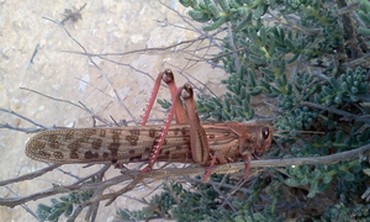Locusts defeated without severe damage to farmland
After fighting the flying creatures, population eradicated without damaging farmland
Sharon Udasin

The plague of locusts that has swept Israel’s South on and off for the past few months has been entirely eradicated without damaging farmland, the Agriculture Ministry announced on Monday.
After 100 days of combating the flying creatures – in cooperation with the Defense Ministry, the Ramat Hanegev and Ramat Eshkol regional councils and Negev farmers – the ministry declared victory against the pests. The eighth of the 10 separate plagues first struck Israel in early March, swarming in from Egypt just a few weeks before Passover. Since then – and most recently when dormant locust larvae began to hatch and take flight – teams have been out and about spraying affected areas both on the ground and via aerial delivery.
“Thanks to the cooperative effort and hard work around the clock from Agriculture Ministry teams, regional councils and Negev farmers, we were able to eradicate the locusts while preventing damage to plants and agriculture,” said Agriculture Minister Yair Shamir.
“While managing the battle against the locusts, the mechanism for handling crises was updated and improved in the Agriculture Ministry, and now an elaborate crisis management system is being created that will provide solutions to any kind of crisis with animals and plants.”
In mid-May, when locust larvae began to hatch from eggs laid in the Negev, Senior Locust Forecasting Officer Keith Cressman from the UN’s Food and Agriculture Organization met with Shamir to strategize about the removal of this new batch of bugs. At the time, two-way locust traffic was still occurring over the Israeli and Egyptian borders.
Field teams from the ministry are now reporting that only a scattered few individual locusts remain, no longer in groups, and that there is no evidence of new swarms within the country or outside its borders. However, if any further invasions do occur, the Agriculture Ministry stressed that its staff members are prepared to handle them.
Since the first locust swarm entered the country on March 3, a team of 25 people in the fields – three people in a “war room” and dozens at ministry headquarters – have worked on the fight against the locusts, with each field team working an average of 15 hours a day in their assigned areas, the ministry said. The cost of treating the swarms amounted to about NIS 7.5 million, covering about 2,000 hours of spraying from the ground and 428 hours from the air, the ministry said.
The Jerusalem Post




